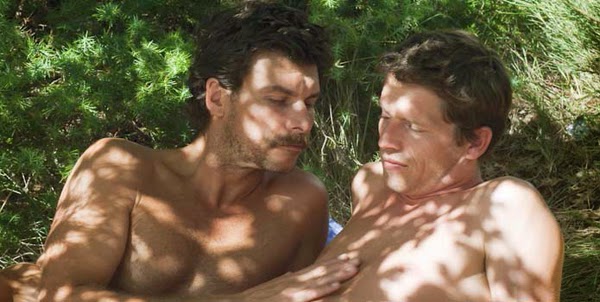TV Review - Boy Culture (Outfest)
Derek Magyar (Watchmen and Star Trek: Enterprise) stars as X, an unnamed prostitute who exclusively services a handful of men in Seattle. This series takes place 10 years after the events of the film. In that film, X was roommates with two guys. One was a Black man named Andrew with whom X had a secret crush. The other was a younger white boy named Joey. By the end of the film, X declared his love for Andrew. They along with Joey created a family. This series has Joey gone with X and Andrew now living in Los Angeles. They're back as roommates again, as they are no longer in a relationship. The series basically resets or reboots things between X and Andrew, starting them back to where they were at the beginning of the film.
X is still working as a prostitute. The problem is that he's older now. It's not stated what X's age is, but he's probably in his mid to late 30's. It's likely that he's in his early 40's. It's not that sex workers can't be in their 40's, but most would likely argue that it's a bit difficult for someone in their 40's to compete. If anyone is familiar with Dirk Shafer's Circuit (2002), which also centers around a sex worker in the Los Angeles gay community, there is a scene where Andre Khabbazi's character of Hector who is only in his mid to late 20's is told by a client that he's too old. However, this series allows for the exploration of ageism within the gay community, as well as see how a sex worker might operate in modern times with things like social media. It also compares and contrasts how people think about sex work 20 or 30 years ago as opposed to today. It used to be a more underground thing, whereas now it's more public. Instead of hiding the fact that you're selling your body, now it's apart of one's marketing or branding.Darryl Stephens (From Zero to I Love You and Noah's Arc: Jumping the Broom) reprises his role of Andrew, the roommate and love interest to X. His character is again reset to where he was at the beginning of the film, which had Andrew dealing with accepting X's sex work, as well as reckoning with coming out to his family and in ways accepting himself. It's not clear if he'll have to go through that same thing all over again. He seems to have moved on from X and is hooking up with another guy, but Andrew isn't given much from his perspective in the first, two episodes, which screened at Outfest. Ironically, Stephens was also featured in Circuit.
When it comes to queer films about gay male prostitution, there are so many that it's practically it's own genre. In fact, X who has his constant and cynical, but witty, voice-over narration made a joke about the over-abundance of gay stories that are about sex workers. I remember seeing Boy Culture in a theater in Philadelphia and that particular line getting the largest laugh from the audience. Queer cinema and queer media often isn't judgmental of sex workers. This series seems like it will continue on that track, as each episode will center around a particular client with whom X will have sex.In that, the series should have some interesting guest stars. Some will be recognizable to gay audiences like Jonathan Lisecki and Steve Grand. The scene-stealer who pops up in every episode is Jason Caceres as Chayce who is functionally this show's version of Joey from the film. He's fun and funny, as well as just a breeze in practically every scene, which is what the entire series will most likely be.
Not Rated but contains nudity and sexual situations.
Running Time: 15 to 20 mins. / 6 eps.
Playing at Outfest Los Angeles, in-theaters and virtually.
For more, go to The Film Collaborative and the film's Kickstarter pages.














Comments
Post a Comment